1902 Search Results for video of the week
September 6, 2018
by Carole Zangari -
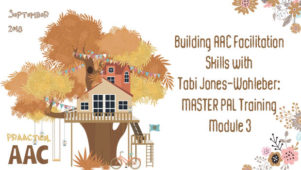
Our training series continues with West Virginia-based SLP Tabi Jones-Wohleber, who works with the AT Team for Frederick County Public Schools in Maryland and provides services to infants and toddlers in the West Virginia Birth to Three programs. In the first two posts, Tabi shared the Overview and Modeling modules and their accompanying resources. In today’s post, the training focuses on an important topic, motivation. ::::::::::::::::::::::::::::::::::::::::::::::::::::::::::::::::::::::::::::::::::::::::::::::::::::::::: Model as a MASTER PAL Module 3: Motivate Facilitator Guidelines Genuine motivation goes well beyond gummies and goldfish; reinforcers are only one small part of the picture as we endeavor to understand what truly drives an individual’s desire to learn and communicate. So much of the time it is the quality of the relationship and the meaningfulness of the interaction. This module discusses the importance of motivation in learning and engaging, whether intrinsic or extrinsic, as well as the undesirable consequences that occur when lack of motivation... [Read More...]
September 4, 2018
by Carole Zangari -

Happy Tuesday, AAC friends! Once a week, we invite you to share your own AAC-related content so that others may learn from you and benefit from your efforts. Schedules are often a little more relaxed in the summer, so share away! It may be a recent post you’ve written, a slide deck from your AAC presentation, a handout, video, or meme that you’ve posted online, an AAC product you’ve created, an announcement for an AAC camp or conference, or any other prAACtical content you developed and want to share with the AAC community. To post your own link, scroll all the way down to the bottom of this post and complete the form. Enter the URL and the name/title in the boxes provided below. If you are on a mobile device, click over to the full website version to do this. The AAC Link Up is moderated to keep us from being... [Read More...]
August 30, 2018
by Carole Zangari -
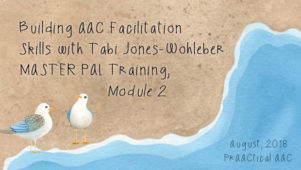
It’s a good day to talk training and we’re incredibly grateful to SLP Tabi Jones-Wohleber for sharing her partner training resources with us. In addition to her work with the AT Team for Frederick County Public Schools in Maryland, Tabi serves young children and their families at West Virginia Birth to Three programs. In the initial post, Tabi introduced the overview module and its accompanying resources. Today, we move onto Module 2 where the focus is on aided language input. ::::::::::::::::::::::::::::::::::::::::::::::::::::::::::::::::::::::::::::::::::::::::::::::::::::::::: Modeling AAC is unquestionably a key component of teaching AAC. Most frequenters of PrAACtical AAC understand that modeling is a naturalistic strategy that functions to support language development by SPEAKING YOUR WORDS. However, misconceptions abound, which often results in modeling opportunities characterized as imitation or compliance tasks. This module unpacks the imperative of modeling to provide a common understanding of what it is (and is not), and why it is a... [Read More...]
August 28, 2018
by Carole Zangari -
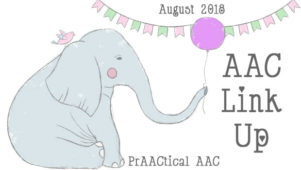
Happy Tuesday, AAC friends! Once a week, we invite you to share your own AAC-related content so that others may learn from you and benefit from your efforts. Schedules are often a little more relaxed in the summer, so share away! It may be a recent post you’ve written, a slide deck from your AAC presentation, a handout, video, or meme that you’ve posted online, an AAC product you’ve created, an announcement for an AAC camp or conference, or any other prAACtical content you developed and want to share with the AAC community. To post your own link, scroll all the way down to the bottom of this post and complete the form. Enter the URL and the name/title in the boxes provided below. If you are on a mobile device, click over to the full website version to do this. The AAC Link Up is moderated to keep us from being... [Read More...]
August 23, 2018
by Carole Zangari -
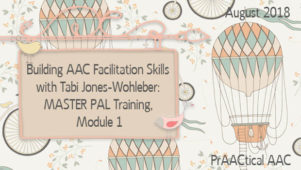
Are you… Hoping to train team members to be better communication partners for their AAC students/clients but overwhelmed by the thought of all the preparation? Relatively new to AAC and not sure what content to share in your training? Looking for additional resources to utilize in your existing training sessions? Good news, AAC friends! This post is for you. We’re so happy to have SLP Tabi Jones-Wohleber returning to the blog to share more of her wonderful AAC resources. Tabi works with young children at the West Virginia Birth to Three program and serves on the AT Team for Frederick County Public Schools in Maryland. Today, she launches a new series on partner training that focuses on the use of aided language input and other facilitative strategies. There are 11 modules in all (1 overview for administrative discussions and 10 for communication partners) and each one includes slides, handouts, discussion prompts, links... [Read More...]
August 21, 2018
by Carole Zangari -

Happy Tuesday, AAC friends! Once a week, we invite you to share your own AAC-related content so that others may learn from you and benefit from your efforts. Schedules are often a little more relaxed in the summer, so share away! It may be a recent post you’ve written, a slide deck from your AAC presentation, a handout, video, or meme that you’ve posted online, an AAC product you’ve created, an announcement for an AAC camp or conference, or any other prAACtical content you developed and want to share with the AAC community. To post your own link, scroll all the way down to the bottom of this post and complete the form. Enter the URL and the name/title in the boxes provided below. If you are on a mobile device, click over to the full website version to do this. The AAC Link Up is moderated to keep us from being... [Read More...]
August 14, 2018
by Carole Zangari -
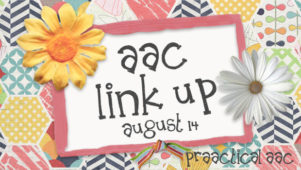
Happy Tuesday, AAC friends! Once a week, we invite you to share your own AAC-related content so that others may learn from you and benefit from your efforts. Schedules are often a little more relaxed in the summer, so share away! It may be a recent post you’ve written, a slide deck from your AAC presentation, a handout, video, or meme that you’ve posted online, an AAC product you’ve created, an announcement for an AAC camp or conference, or any other prAACtical content you developed and want to share with the AAC community. To post your own link, scroll all the way down to the bottom of this post and complete the form. Enter the URL and the name/title in the boxes provided below. If you are on a mobile device, click over to the full website version to do this. The AAC Link Up is moderated to keep us from being... [Read More...]
August 7, 2018
by Carole Zangari -
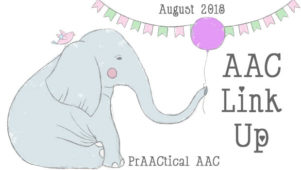
Happy Tuesday, AAC friends! Once a week, we invite you to share your own AAC-related content so that others may learn from you and benefit from your efforts. Schedules are often a little more relaxed in the summer, so share away! It may be a recent post you’ve written, a slide deck from your AAC presentation, a handout, video, or meme that you’ve posted online, an AAC product you’ve created, an announcement for an AAC camp or conference, or any other prAACtical content you developed and want to share with the AAC community. To post your own link, scroll all the way down to the bottom of this post and complete the form. Enter the URL and the name/title in the boxes provided below. The AAC Link Up is moderated to keep us from being spammed, so it may take a little while for your link to show up. Note: If you... [Read More...]
July 31, 2018
by Carole Zangari -
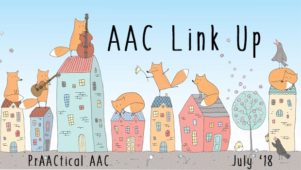
Happy Tuesday, AAC friends! Once a week, we invite you to share your own AAC-related content so that others may learn from you and benefit from your efforts. Schedules are often a little more relaxed in the summer, so share away! It may be a recent post you’ve written, a slide deck from your AAC presentation, a handout, video, or meme that you’ve posted online, an AAC product you’ve created, an announcement for an AAC camp or conference, or any other prAACtical content you developed and want to share with the AAC community. To post your own link, scroll all the way down to the bottom of this post and complete the form. Enter the URL and the name/title in the boxes provided below. The AAC Link Up is moderated to keep us from being spammed, so it may take a little while for your link to show up. Note: If you... [Read More...]
July 30, 2018
by Carole Zangari -
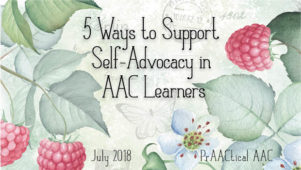
self-ad·vo·ca·cy: self ˈadvəkəsē/ Noun: the action of representing oneself or one’s views or interests. —————————- Empowering AAC learners to advocate for themselves may be one of the most important and impactful things that we can do to help them stay safe and achieve their goals. Here are some ways we can support that process. Provide messages for self-advocacy behaviors: It’s hard to represent your own interests without the appropriate set of vocabulary and messages. Words and prestored messages for protesting and rejecting are essential (e.g., No; Stop; No, thank you; I don’t want to). In addition, consider adding messages which allow the communicator to express disagreement or negative opinions (e.g., I don’t like it; I don’t think so; That doesn’t work for me; This is unfair; That’s disrespectful) and proactively provide self-advocacy information (e.g., Please do what I asked; It’s on my IEP; I have a right to be heard; I... [Read More...]









